|
|
|
Sort Order |
|
|
|
Items / Page
|
|
|
|
|
|
|
| Srl | Item |
| 1 |
ID:
192628


|
|
|
|
|
| Summary/Abstract |
Under President Xi Jinping, the strengthening of the Chinese Communist Party's political control occurs in conjunction with an evolving administrative role for government-affiliated associations. Analysing associations that are subordinate within China's strict hierarchy but which have degrees of operational freedom yields insights into the changing nature of public service and administration in China. Evidence from 63 interviews conducted from 2018 to 2022 with government departments and affiliated associations in the education sector reveals the complexity of state control and degrees of constrained autonomy achieved by affiliated associations. The government exerts control over financing, personnel appointments and core business activities but, over time, associations gain varying degrees of operational autonomy to influence the education agenda and fill gaps in public services. The interdependency and relational variance we find in the case of Ministry of Education-affiliated associations contributes to broader understandings of the complex and fragmentary nature of the Chinese state and public administration.
|
|
|
|
|
|
|
|
|
|
|
|
|
|
|
|
| 2 |
ID:
129442
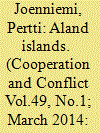

|
|
|
|
|
| Publication |
2014.
|
| Summary/Abstract |
The Åland Islands received their co-sovereign standing from the League of Nations in 1921, the settlement of a Finnish-Swedish dispute. The clash was over ownership, and the league advocated that Åland should remain part of Finland, albeit elevated to the status of a self-governing polity. The verdict implied that Finland's sovereignty was significantly compromised, whereas the islands landed in an in-between situation, being neither local nor fully sovereign. The duality of Åland - remaining an integral part of Finland yet still distinct with a standing of its own, including various cultural and linguistic safeguards - meant more generally that the islands fall through the interstices of the dominant discourses pertaining to political space. However, the lack of any clear conceptual standing has not amounted to anything profoundly disadvantageous. Their liminal nature of being neither this nor that has instead furnished the islands with a rather favourable posture. Their standing, although initially perceived as a loss and still seen in some interventions as unwarranted and viewed as a source of ontological uncertainty, arguably accounts for their ability to transform what usually appears as weakness into a considerable degree of influence. The article thus aims to explore what explains such an outcome and the manner in which the ambiguity of the islands has stood the test of time, taking into account that their standing has, among other things, been impacted by Finland and the islands both joining the EU in 1995 and the sovereignty games involved.
|
|
|
|
|
|
|
|
|
|
|
|
|
|
|
|
| 3 |
ID:
142862
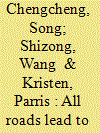

|
|
|
|
|
| Summary/Abstract |
This article draws on the social network embeddedness perspective to construct a multilevel analytical framework through which relations between non-governmental organisations (NGOs) in China and the government are examined. The following arguments presented are based on a comparative case study of two social service NGOs: First, “top-down” and “bottom-up” types of NGOs alike can achieve some degree of autonomy in both internal management and external relations. Second, NGOs may undertake very different strategies to gain autonomy, even in the face of very similar external conditions. Third, under current conditions, whether NGO leaders are embedded in particular political networks, i.e. the political connections of an NGO, will constrain the strategies that NGOs would pursue to achieve autonomy. Finally, a multilevel approach reveals the complexity of NGO–government relations and helps to move the analysis beyond a zero-sum approach to state–society relations in China.
|
|
|
|
|
|
|
|
|
|
|
|
|
|
|
|
| 4 |
ID:
092483
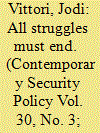

|
|
|
|
|
| Publication |
2009.
|
| Summary/Abstract |
Audrey Kurth Cronin wrote that Terrorism, like war, never ends; however, individual terrorist campaigns and the groups that wage them always do. In order to understand whether counterterrorism strategies and methods are effective in shortening the life-span of individual terrorist groups, scholars and statesmen must first recognize what the survival rate of a terrorist organization is, and what factors contribute to it-a topic that remains understand.
|
|
|
|
|
|
|
|
|
|
|
|
|
|
|
|
| 5 |
ID:
137226
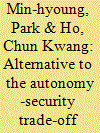

|
|
|
|
|
| Summary/Abstract |
Most of the alliances that were formed during the Cold War period were known as a so-called “asymmetric alliance,” which means strong states provide one-sided support for the partner in a relationship at the expense of the weaker power’s autonomy. In an asymmetric alliance, a weak state gets full security support from the superpower, but in return, the weak state loses its autonomy. In this case, there is a trade-off between security and autonomy of the weaker state. This is what the Autonomy-Security Trade-off Model suggests. However, after the end of the Cold War, the weak powers, especially the developing country, have tried to increase its autonomy without any loss of its security—unlike what the Autonomy-Security Trade-Off Model argues. In this case, there may not be necessarily a trade-off between autonomy and security if a weak state decides to increase both autonomy and security simultaneously. The weak state does not usually want to lose its security, therefore it tries to find a strategy that can increase its autonomy without decreasing its security. In this sense, this paper argues that the Autonomy-Security Trade-off model has limitations to explain the above kind of national action after the Cold War. In line with this, the goal of this paper is to offer an alternative model to explain an asymmetric alliance relationship by looking at the case of the
ROK-U.S. alliance at the turn of the twenty-first century.
|
|
|
|
|
|
|
|
|
|
|
|
|
|
|
|
| 6 |
ID:
120581
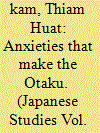

|
|
|
|
|
| Publication |
2013.
|
| Summary/Abstract |
The term 'otaku' is generally used in Japan to denote subcultures revolving around the consumption of popular culture, such as manga, anime and games. This paper, however, seeks to analyze 'otaku' as a label applied to individuals whose consumption is perceived and judged to have compromised certain values in contemporary Japan. Through analysis of interviews with a group of Japanese students, I found that the values they invoke to judge who the 'otaku' are, and which they construe as a form of common sense concerning consumption, correspond to the demands of advanced capitalism: consumption should be productive of capital, either leading to further production or fostering communication that is directly productive. At the same time, people are labeled as 'otaku' not merely for failing to produce capital through their consumption, but also for actively practicing a perversion of the capacities that are necessary to advanced capitalist Japan, most notably imagination and autonomy. 'Otaku' labeling thus points to capital's anxieties over capacities such as imagination, knowledge and autonomy: these capacities, while essential to a flexible and immaterial economy, could potentially become unproductive and threaten advanced capitalism.
|
|
|
|
|
|
|
|
|
|
|
|
|
|
|
|
| 7 |
ID:
108100
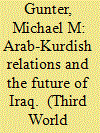

|
|
|
|
|
| Publication |
2011.
|
| Summary/Abstract |
The Iraqi Kurds now not only possess their most powerful regional government since the creation of Iraq following World War I (the Kurdistan Regional Government-krg), but also play a prominent role in the Iraqi government in Baghdad, holding the posts of president, foreign minister and several other cabinet positions. After a great deal of wrangling, the Kurds managed to maintain their strong position in al-Maliki's new Baghdad government finally cobbled together in December 2010. This dual governmental role stood in marked contrast to the situation that existed before the events of 1991 and 2003, when the Kurds were treated as second class citizens and worse. The ultimate question is for how long this unique Kurdish position of strength will last. Many Arabs still resent the Kurdish claims to autonomy as a challenge to the Arab patrimony and see a federal state for the Iraqi Kurds within Iraq as simply a prelude to secession forced upon the Arabs at a moment of temporary weakness following the war in 2003. When will the Iraqi Arabs organise themselves and start trying to reduce the power of the Kurds again? This paper will analyse this developing situation and tentatively conclude that the two sides are most likely to continue to coexist in a troublesome but peaceful relationship.
|
|
|
|
|
|
|
|
|
|
|
|
|
|
|
|
| 8 |
ID:
124424


|
|
|
|
|
| Publication |
2013.
|
| Summary/Abstract |
Indigenous peoples are often perceived as custodians of nature owing to their close relationship with their environment and their nature-based livelihoods. This paper investigates the kinds of environmental agencies that are constructed for, and by, indigenous peoples within the United Nations (UN) Permanent Forum on Indigenous Issues (PF) and the Arctic Council. The particular focus of this research is the issue of responsibility. The article brings together empirical materials from the two forums and engages with them using Foucault-inspired approaches. We offer a critical discussion of indigenous peoples' environmental agency in international politics, addressing the need to problematize representations of indigenous agency that to date have been largely unchallenged in both the practice and study of international politics. We identify three perspectives through which the environmental agency of indigenous peoples is validated and justified: having particular knowledge, being stakeholders, and having a close relationship with nature. Certain kinds of expectations are inscribed in each of these perspectives; responsibility becomes intertwined with agency.
|
|
|
|
|
|
|
|
|
|
|
|
|
|
|
|
| 9 |
ID:
054397
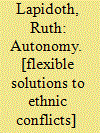

|
|
|
|
|
| Publication |
Washington, D.C., United States Institute of Peace Press, 1997.
|
| Description |
xiv, 298p.
|
| Standard Number |
1878379623
|
|
|
|
|
|
|
|
|
|
|
|
Copies: C:1/I:0,R:0,Q:0
Circulation
| Accession# | Call# | Current Location | Status | Policy | Location |
| 046165 | 323.1/LAP 046165 | Main | On Shelf | General | |
|
|
|
|
| 10 |
ID:
073711
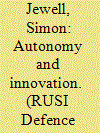

|
|
|
| 11 |
ID:
021107
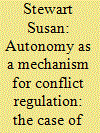

|
|
|
|
|
| Publication |
Winter 2001.
|
| Description |
113-141
|
|
|
|
|
|
|
|
|
|
|
|
|
|
|
|
| 12 |
ID:
098456
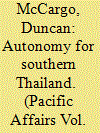

|
|
|
|
|
| Publication |
2010.
|
| Summary/Abstract |
Over 4000 people have died since 2004 in a violent conflict affecting Thailand's Malay-majority southern border provinces, Pattani, Yala, Narathiwat, and four districts of neighbouring Songkhla. Offering some form of autonomy or substantive decentralization to this troubled region might seem like an obvious response to the violence, but the topic has remained largely taboo until recently. Autonomy is seen by Bangkok in essentially pre-Cold War terms, as the thin end of the wedge, which could prefigure an unravelling of the unitary state crafted during the time of King Chulalongkorn. Nevertheless, in recent years a number of senior figures from different positions in Thai society have voiced support for alternative governance arrangements for the deep South. These have included Dr Prawase Wasi, one of the architects of the 1997 constitution, former prime minister Chavalit Yongchaiyudh, former interior minister Chalerm Yubamrung, and a number of academics. Their proposals range from full autonomy for the deep South to a national project of regionalization, as well as the creation of a new ministry to oversee the area. Prime Minister Abhisit Vejjajiva has offered mixed messages on the subject but has indicated sympathy for some form of decentralization. This article argues that despite the controversial nature of such proposals, there is a slowly emerging consensus around the need for a political solution to the conflict. In other words, Thailand is moving towards a post-Cold War understanding of autonomy as a means of preserving rather than undermining the nation state.
|
|
|
|
|
|
|
|
|
|
|
|
|
|
|
|
| 13 |
ID:
104660


|
|
|
| 14 |
ID:
178229


|
|
|
|
|
| Summary/Abstract |
This article builds on the ambiguous concept of the autonomy of universities with three historical turns in two dominant types of universities in the world – the Anglo-Saxon and American models, represented by the British and American institutions, and the Continental models, including the recently emerging Chinese University 3.0. Based on empirical data from two comparative case studies with a documentary analysis approach, I investigate the structure of the zhong-yong model of self-mastery, demonstrating how it may differ from the Western models and offering cultural interpretations for these nuances. The article concludes that self-mastery in the Chinese context provides an additional form of autonomy which is rooted in the pragmatic Confucian concept of zhong-yong. It is also found that through the pragmatism of self-mastery, the zhong-yong model enables Chinese universities to directly serve the state and, at the same time, to legitimate the priority given to their development by state power, thus creating abundant space and resources for them to fully unfold their potentialities. With multilayered and multidirectional power relationships, this model of governance has enabled Chinese universities to radically transform themselves in a short period of time and will allow them to eventually become global leaders, although they may have to sacrifice autonomous freedom in some ways.
|
|
|
|
|
|
|
|
|
|
|
|
|
|
|
|
| 15 |
ID:
090897
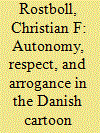

|
|
|
|
|
| Publication |
2009.
|
| Summary/Abstract |
Autonomy is increasingly rejected as a fundamental principle by liberal political theorists because it is regarded as incompatible with respect for diversity. This article seeks, via an analysis of the Danish cartoon controversy, to show that the relationship between autonomy and diversity is more complex than often posited. Particularly, it asks whether the autonomy defense of freedom of expression encourages disrespect for religious feelings. Autonomy leads to disrespect for diversity only when it is understood as a character ideal that must be promoted as an end in itself. If it by contrast is understood as something we should presume everyone possesses, it provides a strong basis for equal respect among people from diverse cultures. A Kantian conception of autonomy can justify the right to freedom of expression while it at the same time requires that we in the exercise of freedom of expression show respect for others as equals.
|
|
|
|
|
|
|
|
|
|
|
|
|
|
|
|
| 16 |
ID:
068297
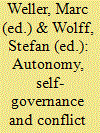

|
|
|
|
|
| Publication |
London, Routledge, 2005.
|
| Description |
xi, 276p.
|
| Standard Number |
0415339863
|
|
|
|
|
|
|
|
|
|
|
|
Copies: C:1/I:0,R:0,Q:0
Circulation
| Accession# | Call# | Current Location | Status | Policy | Location |
| 051005 | 320.15/WEL 051005 | Main | On Shelf | General | |
|
|
|
|
| 17 |
ID:
117909
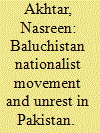

|
|
|
|
|
| Publication |
2011.
|
| Summary/Abstract |
Pakistan is one of the most complex multi-ethnic societies in the developing Islamic world. Each of the ethnic groups that now comprise Pakistan has very distinctive identity, folklore, history and political interests. However, Pakistan's nation builders were not alive to the ethnic question and failed to integrate ethnic groups into a Pakistani nationhood through recognised principles of autonomy, representation and empowerment. Instead, a non-representative, military-led authoritarian system suppressed legitimate regional and ethnic aspirations, relying too heavily on Islam and Pakistan ideology (two nation theory) to forge a sense of common nationhood. It didn't work: since the 1950s there have been four major insurrections against the central government by Baluch nationalists. Although the Baluch national question has its roots in the colonial era, it emerged as a significant political and security issue because an over-centralised and non-representative power system couldn't address the issue of ethnic diversity. Baluchistan is now a hub of interests for regional and major powers.
|
|
|
|
|
|
|
|
|
|
|
|
|
|
|
|
| 18 |
ID:
114822


|
|
|
|
|
| Publication |
2012.
|
| Summary/Abstract |
Although realist perspectives seem challenged to explain European choices and preferences, realism retains great utility with its stress on states and states' concern for their national interests. Traditional realist analysis of European security policy err, rather, by focusing on balancing and related concepts such as soft balancing and balancing for autonomy. These accounts are theoretically and empirically flawed. Whilst balancing perspectives shed some light on European security policy predispositions, bandwagoning better explains trans-Atlantic contemporary security cooperation and increases the explanatory power of realist theories. The case for European bandwagoning is illustrated here by the empirical experience of prominent European Union military initiatives and the French defence reforms in the post-Cold War period. The tendency to bandwagon shows that European attempts to increase capabilities are strengthening rather than weakening transatlantic ties. Contrary to dominant realist views, through bandwagoning NATO benefits from European security and defence policy, becoming more durable and stronger than traditional realism expects.
|
|
|
|
|
|
|
|
|
|
|
|
|
|
|
|
| 19 |
ID:
040230
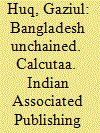

|
|
|
|
|
| Publication |
Calcutaa, Indian Associated Publishing, 1971.
|
| Description |
178p.hbk
|
|
|
|
|
|
|
|
|
|
|
|
Copies: C:1/I:0,R:0,Q:0
Circulation
| Accession# | Call# | Current Location | Status | Policy | Location |
| 009430 | 954.9205/HUQ 009430 | Main | On Shelf | General | |
|
|
|
|
| 20 |
ID:
084627
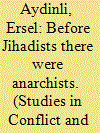

|
|
|
|
|
| Publication |
2008.
|
| Summary/Abstract |
With the wave of violent jihadist activities in recent years, the world's attention has shifted away from a traditional prioritizing of state forms of formal violence toward one focusing on an apparently "new" phenomenon of transnational violence. Yet transnational violence itself is not a new phenomenon; it in fact precedes international, state-centric violence. For reasons related to gaps or defects within the state system or to surges in the capacities of individuals and societies, transnational violence has periodically made attempts to regain its primary position. Prior to the violent jihadists, the last of these efforts was that of the late-nineteenth-century Anarchists. This article looks at the dynamics of the Anarchists's failure as part of a transnational violence continuum, using a framework based on their autonomy, representation, and influence. The results provide an historical example against which future studies about the current episode of transnational violence may be compared.
|
|
|
|
|
|
|
|
|
|
|
|
|
|
|
|
|
|
|
|
|